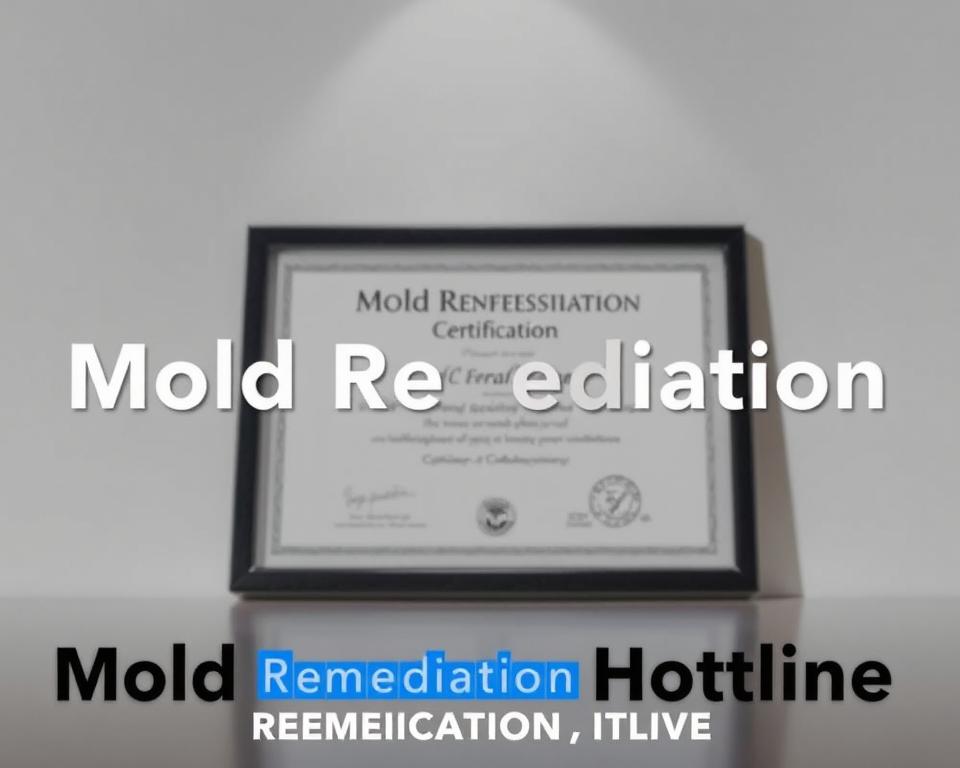Are you thinking about a career in mold remediation? Wondering how to get certified? It’s a journey with steps like finding out your state’s mold rules and taking a mold course1. Many people, like homeowners and lenders, like to hire certified mold experts2. Getting certified boosts your career and makes you stand out in the job market.
To get certified, you need to finish a course like the 24-hour Certified Mold Remediator (CMR) course from the PMII1. This course has 13 lessons on how to remove mold1. You can get 14 Continuing Education Units (CEUs) from the IICRC when you’re done1. With mold services in demand, getting certified could be a smart career choice. The average mold inspection cost was $644 in 2022, says HomeAdvisor2.
Key Takeaways
- Getting certified in mold remediation can enhance your professional credibility and provide a competitive edge in the job market.
- The certification process typically involves completing a course, such as the 24-hour Certified Mold Remediator (CMR) course offered by the PMII1.
- Many homeowners, homebuyers, lenders, and insurance companies prefer to work with certified mold professionals, even when state licensing is not required2.
- The national average price of a mold inspection was $644 in 2022 according to HomeAdvisor2.
- Participants can earn 14 Continuing Education Units (CEUs) from the Institute of Inspection Cleaning and Restoration Certification (IICRC) upon completion1.
- Getting certified in mold remediation can be a lucrative career move, with residential mold inspections priced between $300 and $700 based on the size of the home2.
Understanding Mold Remediation Certification
Mold remediation certification is key in the mold removal world. It shows who knows how to fix mold problems well3. The CMRC certification is special because it shows a person can fix mold safely and right3.
Getting certified is very important. It helps professionals find jobs and earn more3. It also makes them more trusted by clients3.
To get certified, one must finish a training course and pass a test4. The course teaches about finding, fixing, and stopping mold5. Getting certified shows a person is serious about doing a good job.
- More than 60 places in the U.S. teach how to be a mold expert3.
- The mold fixing business is growing fast, expected to hit $4 billion by 20253.
- About half of all homes have had mold problems3.
Requirements for Certification
To get certified in mold remediation, you need to meet some rules. You must be at least 18 years old to apply for a mold inspector license6. Also, you should have a high school diploma or something similar6.
Knowing a bit about building science helps, but it’s not a must for the MICRO Certified Mold Remediation Contractor (CMRC) course7.
You also need some experience. You should have at least 2 years of work in mold inspection or remediation6. You must pass a test approved by the department to get your license7.
If you have a college degree, you need 1 year of field experience. If you only have a high school diploma, you need 4 years of experience7.
You also need to have insurance. You must have at least $1 million in general liability insurance7. Military veterans and their families might get discounts or fee waivers7.
To get ready for the test, you can take a mold mitigation course or get mold inspection certification8. By following these steps, you can make sure you’re ready to offer top-notch mold remediation services.
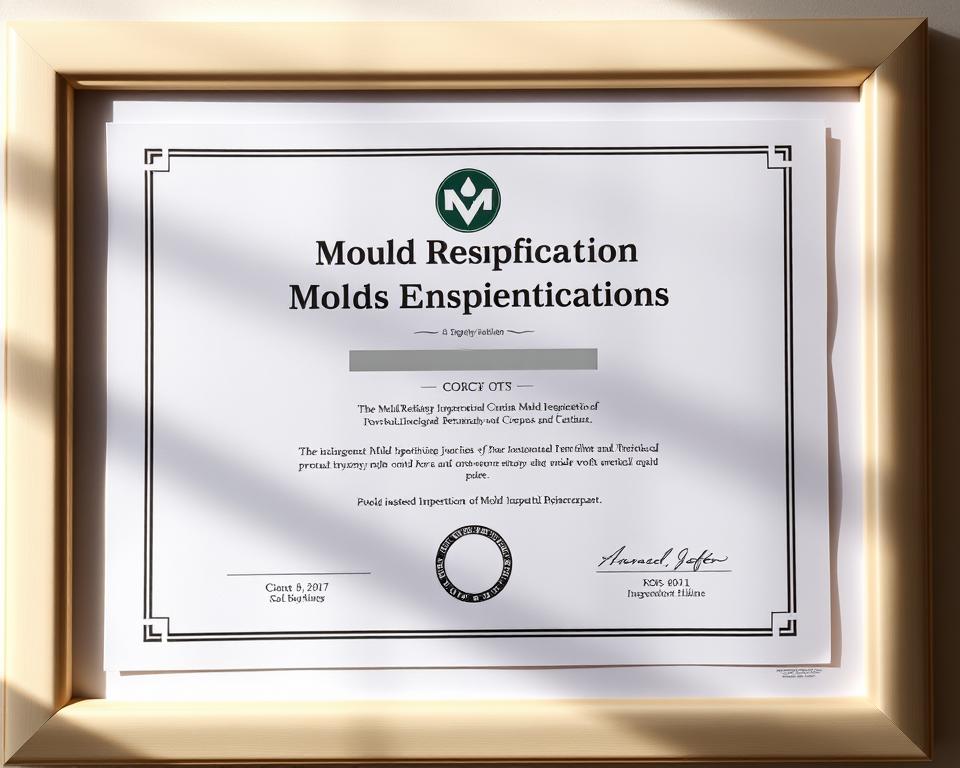
Types of Mold Remediation Certifications
Getting a mold remediation license is key for those in this field. There are many certifications, like the best mold remediation programs. Each state has its own rules, but most need education, experience, and training9. You must be 18 or older and pay a $450 fee for a new license9.
Certifications from IICRC and NORMI are well-known. They show you know a lot about mold removal. The Online Mold Inspector Certification costs $495 and takes six months10.
Certification Options
- Certification by IICRC
- Certification by NORMI
- State-Specific Certifications
States also have their own mold remediation license rules. It’s important to know what your state needs for a license9. The National Association of Mold Professionals (NAMP) helps a lot. They are the oldest and largest Mold Association in America10.
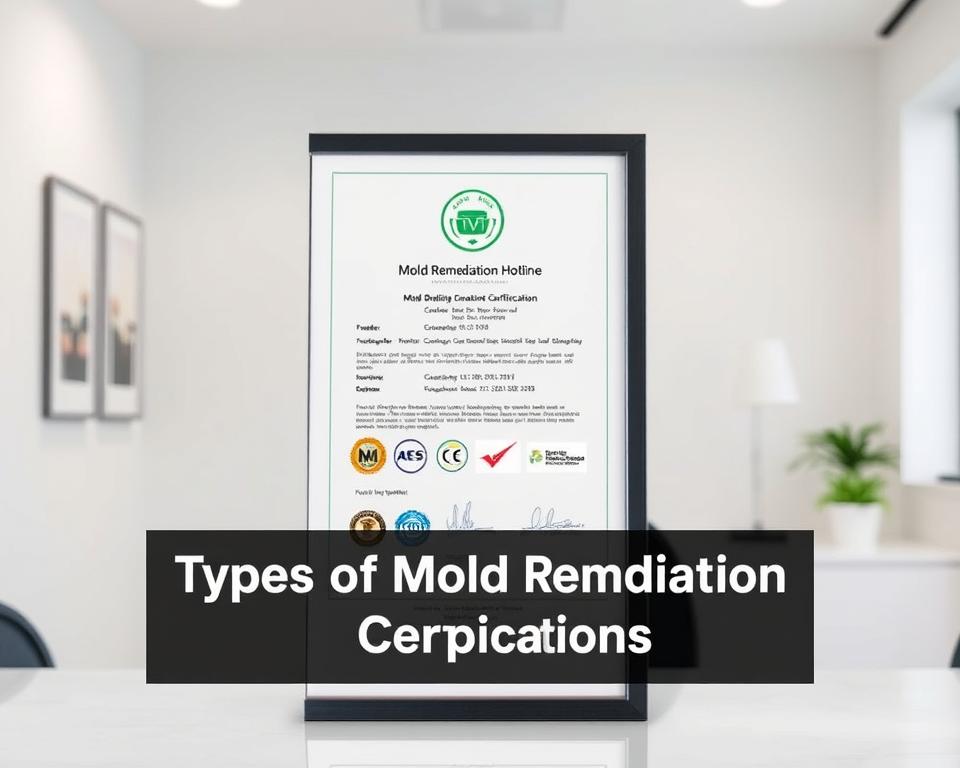
| Certification | Cost | Duration |
|---|---|---|
| Online Mold Inspector Certification | $495 | Up to 6 months |
| IICRC Certification | Varies | Varies |
| NORMI Certification | Varies | Varies |
Choosing the right certification shows you’re serious about your work. It helps you have a good career in mold removal10.
Choosing the Right Certification Program
When picking a mold remediation certification program, look at its reputation, what it teaches, and if it’s accredited11. A good program should teach about mold removal, safety, and follow industry standards. It should also give you hands-on practice and help you get ready for the exam.
Think about if you want online or in-person training12. Online training is easy and flexible, letting you learn at your own speed. But, in-person training lets you get real experience and talk with teachers and classmates. The CMRC course is about 15 hours long. It’s designed to be easy to follow, with 24/7 online access12.
Choosing the right program depends on what you need and want for your career. Do your homework and compare different programs. This way, you’ll find one that fits your goals. Getting a good certification can open up more job chances and help you earn more11.
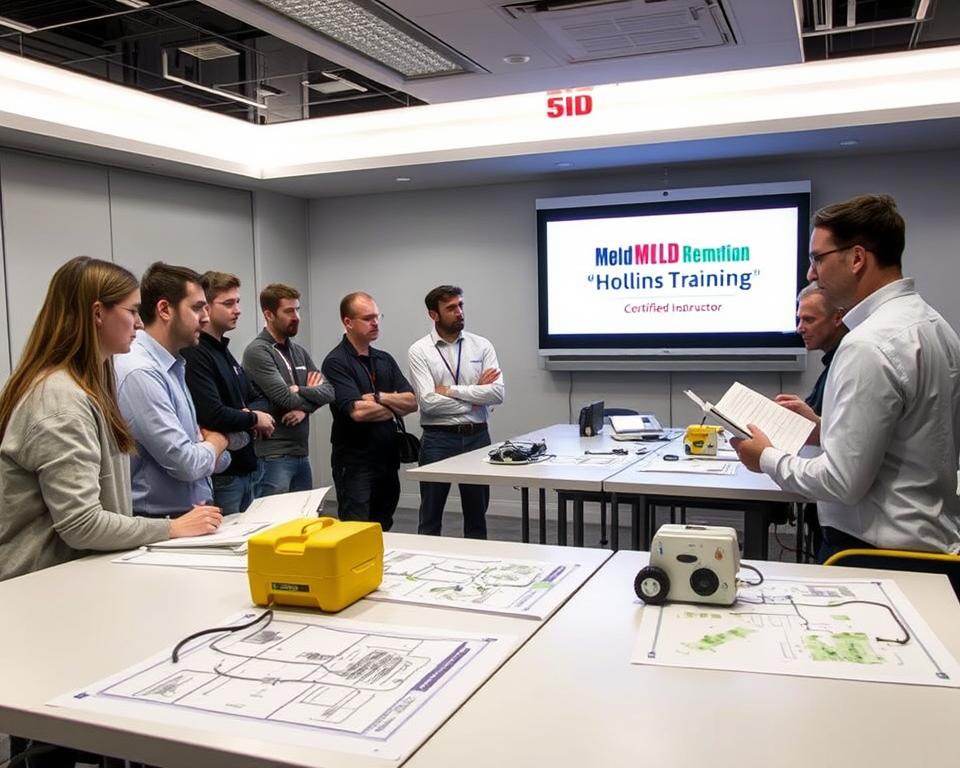
Course Content and Curriculum Overview
The mold inspection certification and mold mitigation course teach professionals a lot. They learn about mold, health, building science, and how to manage risks13. These courses help professionals grow their business and make more money14.
Hands-on training is key in mold remediation courses. Students do real activities like checking for mold and using special tools15. They also learn about safety, legal stuff, and how to write reports.
Some courses, like the MICRO CMRC course, give a full education for mold work13. Prices vary, with some courses costing $397.0014. Training times also differ, with some lasting 14 hours14.
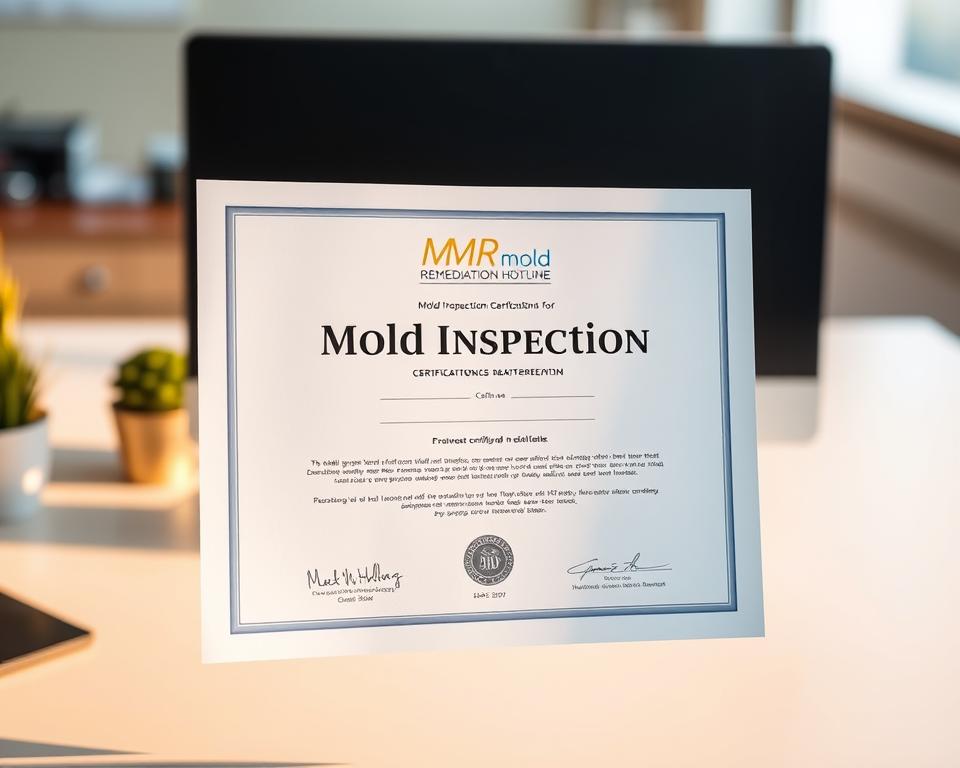
After finishing a mold course, professionals can do mold work well. They can earn more and stand out in their field14.
Duration and Cost of Certification Programs
Thinking about getting certified in mold remediation? It’s key to know how long and how much it costs. Getting a mold inspection certification can take a few weeks or months16. Prices vary, from $249.00 for a basic course17 to $674.00 for a full bundle16.
The cost of mold remediation certification includes the course price and extra fees for materials. For example, the MICRO Certified Mold Inspection (CMI) course is $399.00. The MICRO Mold Inspection & Remediation Certification Course Bundle is $674.0016. It’s smart to look around and compare prices to find the best deal.
Some programs, like the CMRC mold remediation course, offer 17 sessions and 14 hours of continuing education16. Others, like the NAMP-certified course, focus on mold inspection and remediation18. When picking a program, think about the length, cost, and what you’ll learn. Make sure it fits your career goals and needs.
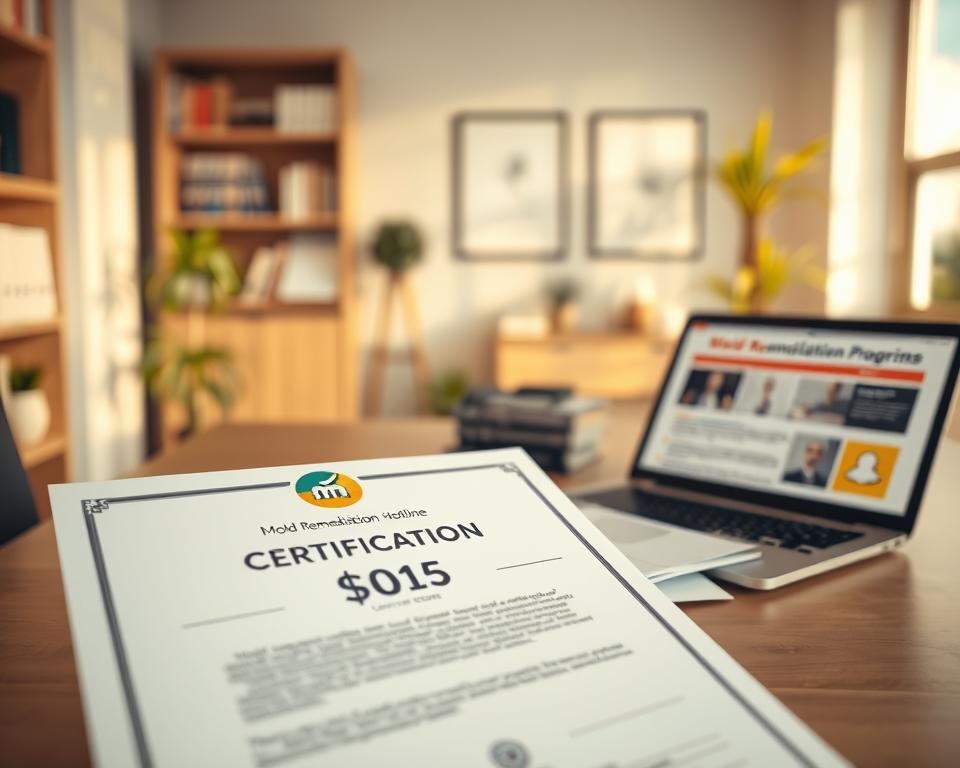
Preparing for the Certification Exam
To pass the mold removal training and mold inspection certification exam, you must prepare well. The Environmental Protection Agency (EPA) helps certify mold removal experts19. Getting certified shows you’ve learned a lot about mold removal19.
Good study materials are key to doing well. The CMRC course has flashcards and quizzes for practice20. Also, you might need to take more classes to keep your certification19.
Here are some tips for doing well on the exam:
- Finish a detailed mold removal training program
- Practice with sample questions and case studies
- Keep up with new industry info and best ways to do things
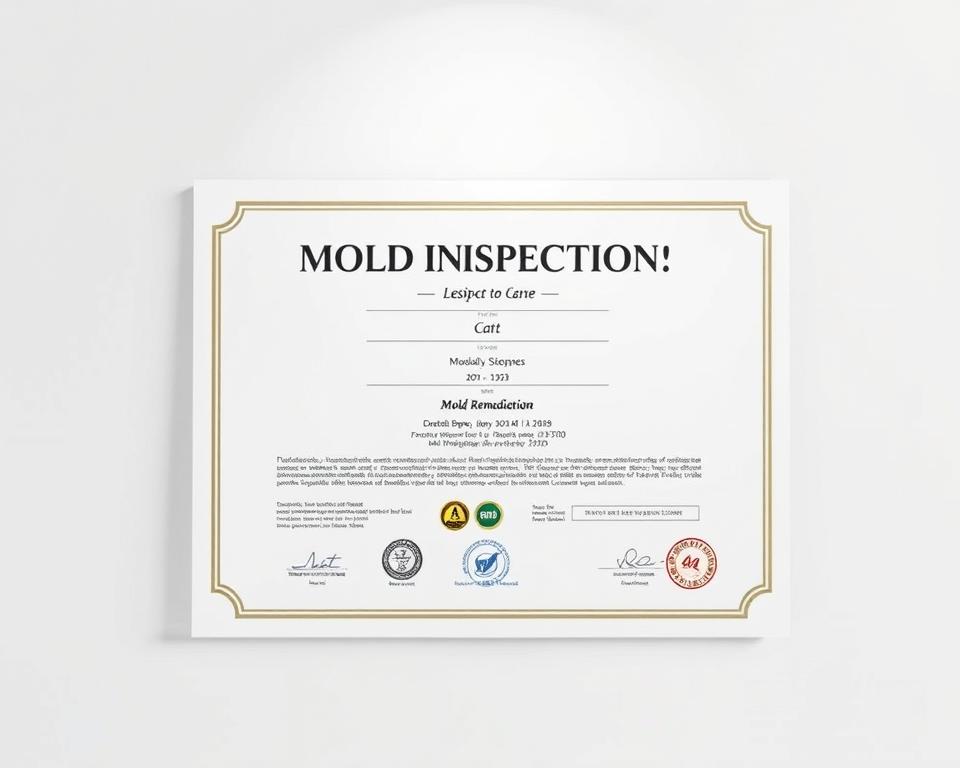
Follow these tips and use the right study tools. This will help you pass the exam and become a certified mold expert19.
Getting Certified: The Examination Process
To get a mold remediation license, you must pass a test. The test has multiple-choice questions and hands-on parts21. It checks if you know about mold, how to get rid of it, and safety rules22.
The test score needed to pass is different for each group23. But most need a score of 70% to 80%. To get ready, you can use online courses and practice tests21. Also, having real experience helps a lot.
Some important things you’ll learn include:
- Mold biology and ecology
- Mold inspection and assessment
- Mold remediation and removal
- Safety protocols and personal protective equipment (PPE)
Getting the best mold remediation certification can lead to better jobs and more money22. It’s important to pick a good certifying group23.
| Certification | Requirements | Cost |
|---|---|---|
| Mold Remediation Certification | 28-40 hours of training | Varies by location |
| Mold Assessor and Remediator License | 24 hours of training | Included with exam fee |
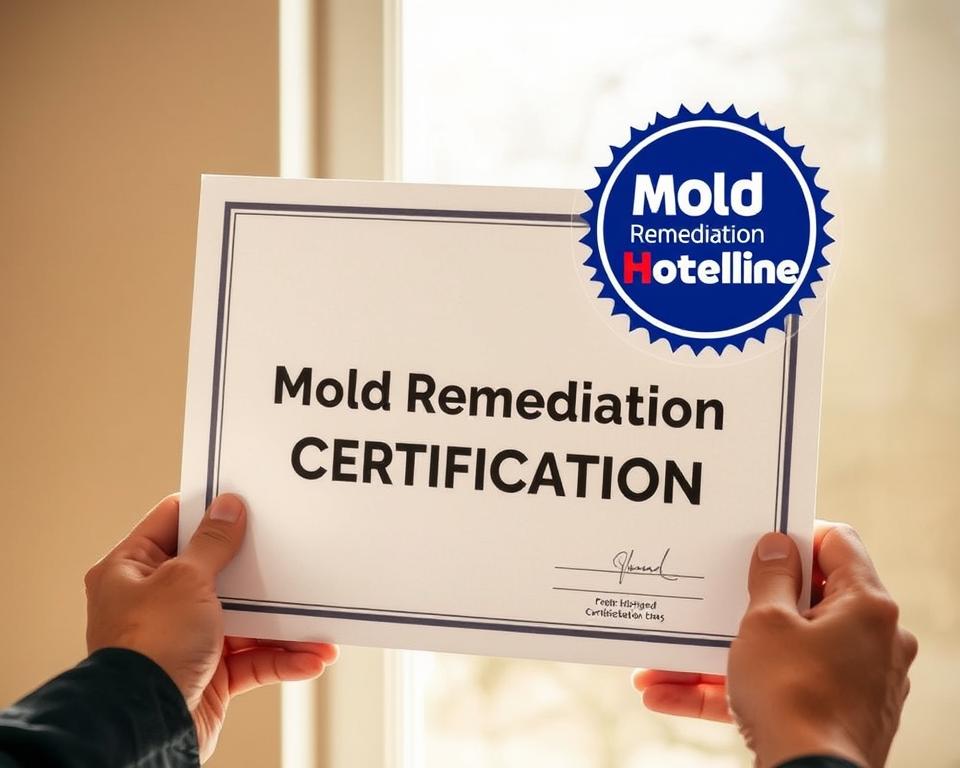
Maintaining Your Certification
To keep your mold remediation certification, you must do continuing education. You can take an accredited mold remediation course or join mold removal training programs24. Groups like NORMI offer training that some states, like Florida, accept25.
Some courses, like the MICRO Certified Mold Inspector (CMI) course, cost $399.00. It includes tuition, materials, online tests, certification, and a 1-year MICRO Membership24. The PMII’s Certified Mold Remediator (CMR) course is 24 hours long. It gives 14 Continuing Education Units (CEUs) from the IICRC1.
Continuing Education Requirements
You need to collect CEUs every year to keep your certification25. The accredited mold remediation course and mold removal training help you meet this need.
Renewal Process and Fees
The cost and steps to renew your certification vary. Some courses, like the MICRO Certified Mold Inspector (CMI) course, include a 1-year MICRO Membership24. Others have different rules. Always check with your certifying group for details on renewal and fees.
Legal and Regulatory Considerations
Professionals need to know the laws about mold inspection and mitigation26. Laws about mold vary by state. Some states have strict rules, while others have few.
Not following mold laws can cost a lot. Fines can be thousands of dollars26. Using certified mold experts can cost more but lowers risks26.
Knowing the laws is key. It helps professionals do their job right. They can avoid big problems.
Learning about mold laws helps staff do better. It builds trust with clients26. Having proof of following laws can help in court26. It shows you care about quality and following rules.
Career Opportunities After Certification
Getting a mold remediation certification opens doors to many jobs. More people are fixing mold at home, which means more work for experts27. Companies also want their workers to be well-trained, making certification key27.
Jobs in mold remediation include:
- Mold inspector
- Mold remediation specialist
- Indoor air quality consultant
The mold remediation market is growing fast, at 12% a year28. This means lots of jobs for those who are certified28. About half of construction and real estate jobs need people who know about mold28.
With the right training, you can find a good job in this field. It’s a growing area with lots of chances for success.
Learning how to get certified in mold remediation can help you stand out. Mold inspectors can make $40,000 to $70,000 a year, based on their experience and where they work28.
Conclusion: Taking the Next Steps
Now that you have your mold remediation certification, it’s time to move forward29. The time needed to fix mold can vary. It depends on how much mold there is and how big the area is29. Experts use special tools to find mold accurately, which helps plan the best fix29.
By sharing your skills and making connections, you can become a trusted mold expert in your area.
Networking and Professional Development Opportunities
Joining groups like the30 International Institute of Cleaning and Restoration Certification (IICRC) or the National Organization of Remediators and Mold Inspectors (NORMI) is great30. These groups offer learning chances, events, and ways to meet other mold experts30. Keeping up with new trends and rules will make you a top service provider.
It’s important to work with qualified people to avoid health risks30. By always learning and getting better, you’ll be ready to grow your business and serve your clients well.
FAQ
What is mold remediation certification?
Why is mold remediation certification important?
What are the requirements for mold remediation certification?
What types of mold remediation certifications are available?
How do I choose the right mold remediation certification program?
What is the course content and curriculum for mold remediation certification?
How long does it take to complete a mold remediation certification program, and what are the associated costs?
How do I prepare for the mold remediation certification exam?
What is the examination process for mold remediation certification?
How do I maintain my mold remediation certification?
What are the legal and regulatory considerations for mold remediation professionals?
What career opportunities are available for certified mold remediation professionals?
Source Links
- https://www.moldinspectioninstitute.com/mold-remediation.php
- https://www.ahit.com/home-inspection-career-guide/how-to-become-a-mold-inspector/
- https://dol.ny.gov/approved-mold-training-course-providers
- https://dol.ny.gov/mold-program
- https://www.osha.net/mold-remediation-certification-guide/
- https://raflorida.org/becoming-a-mold-inspector-in-florida-all-you-need-to-know/
- https://www.myfloridalicense.com/CheckListDetail.asp?SID=&xactCode=1030&clientCode=0702&XACT_DEFN_ID=13112
- https://www.neti.education/mold-certification-florida/
- https://www.tdlr.texas.gov/mld/mldcontractor-apply.htm
- https://oshatraining.com/online-training/mold-inspector-certification-course-6-hour/
- https://contractortrainingcenter.com/collections/mold-services-professional
- https://www.tuckey.com/blog/what-is-mrt-mrs-certification/
- https://bettercertify.com/what-course-do-you-need/
- https://contractortrainingcenter.com/collections/mold-services-professional?srsltid=AfmBOorlYB8v2bXTqavKMITeSbn4-ANf9GJLcUoES6LF6IpQf321l9NF
- https://www.besttrainingschool.com/newyork.php
- https://www.moldcareer.com/training-certification/4/5/195/MICRO-Certified-Mold-Remediation-Contractor-CMRC-Course/?srsltid=AfmBOork3WYdv-jbaEFpSZm2wJBUx48WvWQ4OL8vz1nh4ExNsOtOGAMk
- https://iicrc-cec.com/web/courses.php?siteid=248&courseid=47
- https://www.360training.com/blog/become-certified-mold-inspector?srsltid=AfmBOooC_9wcH09dFKs17OtgftbM5WKFTQBea8N1GbFqcTChCbGQWfRD
- https://www.neti.education/mold-remediation-certification-a-basic-guide/
- https://www.zackacademy.com/class/mold-certification
- https://www.360training.com/blog/become-certified-mold-inspector?srsltid=AfmBOorzKUz-8tP9UlB00mTKTyQwWTsLX9s23RGu2Wx0ZLlQlWrWbTty
- https://www.nachi.org/moldcourse.htm
- https://www.normi.org/resources/normi-certification-licensing-processes/
- https://www.moldcareer.com/training-certification/4/5/195/MICRO-Certified-Mold-Remediation-Contractor-CMRC-Course/?srsltid=AfmBOorxGfivnB824_WfiszBlOajLQaLLK0eqFLJL78loqUobDXMNTjc
- https://www.normi.org/the-normi-institute-and-mold-training-programs/
- https://www.vertenviro.com/en/blog/mold-regulation-compliance-what-contractors-need-to-know
- https://www.neti.education/how-to-prepare-for-a-career-in-the-mold-industry/
- https://www.360training.com/blog/become-certified-mold-inspector?srsltid=AfmBOooi7vX4Z2ACX1P370_GqJwPZxI22XAGMsiFbh7DnqN4TJrLmLub
- https://nvwaterandfire.com/mold-remediation-timeline-for-your-home/
- https://mavenaircare.com/mold-remediation-process-from-inspection-to-removal/
